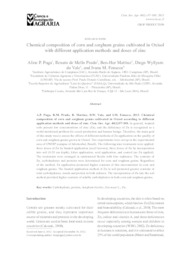Chemical composition of corn and sorghum grains cultivated in Oxisol with different application methods and doses of zinc.
Chemical composition of corn and sorghum grains cultivated in Oxisol with different application methods and doses of zinc.
Author(s): PUGA, A. P.; PRADO, R. de M.; MATTIUZ, B.; VALE D. W. do; FONSECA, I. M.
Summary: In general, tropical soils present low concentrations of zinc (Zn), and the deficiency of Zn is recognized as a world nutritional problem for cereal production and human beings. Therefore, the main goal of this study was to assess the effects of different methods of Zn application on the quality of corn and sorghum grains grown in Oxisol. Two experiments were set up in the experimental area of UNESP (campus of Jaboticabal, Brazil). The following nine treatments were applied:three doses of Zn by banded application (seed furrows), three doses of Zn by incorporation into soil (0-20 cm depth), foliar application, seed application, and control (no Zn applied). The treatments were arranged in randomized blocks with four replicates. The contents of Zn, carbohydrates and proteins were determined for corn and sorghum grains. Regardless of the method, Zn application promoted higher contents of this micronutrient in corn and sorghum grains. The banded application method of Zn in soil promoted greater contents of total carbohydrates, starch and protein in both cultures. The incorporation of Zn into the soil method provided higher contents of soluble carbohydrates in both corn and sorghum grains.
Publication year: 2013
Types of publication: Journal article
Unit: Embrapa Maranhão
Keywords: Carboidrato, Milho, Oxisols, Proteina, Solo tropical, Sorghum Bicolor, Sorgo, Zea Mays, Zinco
Observation
Some of Embrapa's publications are published as ePub files. To read them, use or download one of the following free software options to your computer or mobile device. Android: Google Play Books; IOS: iBooks; Windows and Linux: Calibre.
Access other publications
Access the Agricultural Research Database (BDPA) to consult Embrapa's full library collection and records.
Visit Embrapa Bookstore to purchase books and other publications sold by Embrapa.

